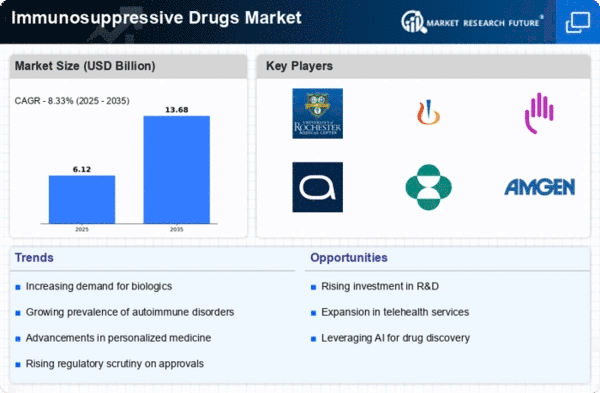Market Share
Immunosuppressive Drugs Market Share Analysis
In the complex landscape of Immunosuppressive Drugs Market, companies use a contingent variety of methods to attain market-share and to cater to the complicated medical needs of patients who undergo organ transplantation or people who suffer from autoimmune diseases. One of the main approaches refers to diverse of drugs by innovation. The pharmaceutical industry spends huge resources on creating new drugs for immunosuppression including improved effectiveness profile, fewer adverse effects, and specific mechanisms of action. Through the development of cutting-edge solutions, staying in a competitive market and assisting medical practitioners with more sophisticated tools to control the immune system is the goal of these firms.
While cost leadership is the next decisive stride in the Immunosuppressive Drugs sector. Some firms concentrate on cheap drug production of immunomodulatory drugs which comply with treatment quality. These tactics are essential since patients and health systems strive for affordable solutions that give long-term answer for immune system management. Companies thrive in the immunosuppressive drug segment by fine tuning their manufacturing processes, economically negotiating supplier contracts and implementing cost efficient distribution routes. This results in lower prices and more access to life saving medications.
Market segmentation has become a very important tool for the strategizing of the Immunosuppressive Drugs Market. Companies relate their medications to the respective segments, for example post-transplant immunosuppression, rheumatoid arthritis or inflammatory bowel disease. The targeted approach enables the drug makers to attend the broad spectrum of immune-related diseases and patients' health concerns providing the high-quality products that will be appreciated by health care professionals and people with this specific medical condition.
Mutual connections and joint efforts are often a part of the Immunosuppressive Drugs Market. Transplantation centers, rheumatology clinics, or research institutions tend to be the key partners of the pharma companies when the aim is the improvement of the immunosuppressive drugs. Building close partnerships with the main stakeholders of healthcare industry permits companies to acquire new knowledge about clinical practices, gain accessibility to real world patient data and make sure the successful integration of their medications onto treatment regimen.
Brands and image management are vital drivers of market share for the Immunosuppressive Drugs Market. Organizations allocate funds to strive for brand novelty extending to factors such as safety, efficacy, and patient well-being. Trust building and credibility are a must in this market where both patients and healthcare professionals are expected to trust the drugs used for successful transplantation or autoimmune disease management.



















Leave a Comment